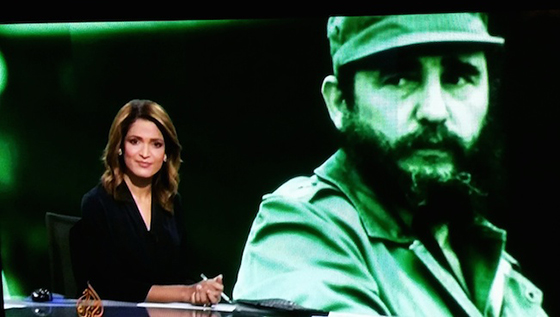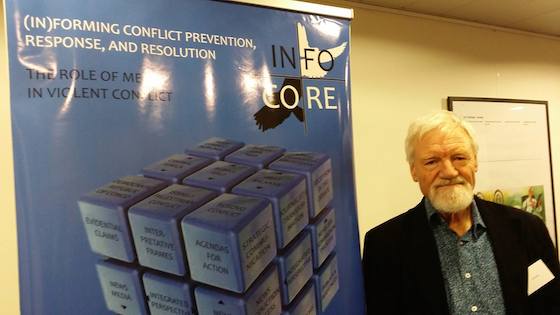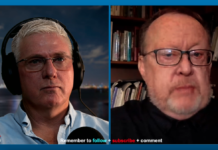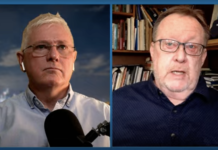AsiaPacificReport.nz
West Papuans have been standing alone in their struggle for independence since Indonesia started colonisation in 1963, says a statement by a new civil society group supporting West Papuan self-determination on the eve of Morning Star flag-raising day.
“The human rights condition is getting worse, land grabbing is rampant, and there have been more than 4700 unlawful arrests of West Papuans in 2016 alone,” the statement said.
“We, Indonesian people united under ‘Front Rakyat Indonesia untuk West Papua‘ (Indonesian People’s Front for West Papua), will declare our support for West Papuans seeking their right to self-determination.”
The Fri West Papua logo.
Australian author Jason MacLeod, who wrote the recent book Merdeka and the Morning Star about civil resistance, describes this new development as the “most remarkable press release” he has seen emerging from the Indonesian solidarity movement for some years.
“This new grouping has been slowly building for some time. Now they express their unqualified support for West Papuans to determine their own future, even if that means separating from Indonesia,” MacLeod says.
“So clear. So brave. There is every chance the state will come down hard on these folks. And still they are prepared for that.
“They demonstrate some of the best of Indonesia.”
On the front’s website, the following statement has been published in Bahasa.
Indonesian People’s Front for West Papua Declaration – November 29, 2016
Greetings of National Liberation of West Papua!
Amolongo, Nimo, Koyao, Koha, Kinaonak, Nare, Yepmum, Dormum, Tabea Mufa, Walak, Foi Moi, Wainambe, Nayaklak
Wa…wa…wa…wa…wa…wa..wa..wa..wa..wa!
“Independence is truly the right of all nations and thus colonialism in the world must be abolished since it contravenes the sense of humanity and justice.”
Thus says the Preamble of the Indonesian Constitution of 1945. In reality, however, West Papua shows the opposite. The West Papuan people have experienced colonialisation of the Unitary State of the Republic of Indonesia.
Although the Indonesian people were subjects to the Dutch colonialisation, the Japanese fascism and the white supremacy, the memory of the past oppression is not able to turn the government of Indonesia to be more humane. Manipulation of history, discrimination, torture, imprisonment, and extermination — all have been done systematically for more than 50 years.
What is happening in Papua?
The majority of Indonesians believe that West Papua is Indonesia. It is not true! West Papua is not Indonesia. There is no happiness for the West Papuans as long as they become part of Indonesia. It is not possible for the West Papuans to live normally if manipulation and deceit of history persist, racial discrimination has been entrenched in every aspect of lives, genocide continues in a systematic way, and extortion of natural wealth destroys the livelihood and the culture of West Papuans.
1. Manipulation and deceit of history
On 27 December 1949 when the Netherlands transferred the sovereignty to Indonesia, West Papua was a non-governing territory as the United Nations and the Netherlands, which was then the colonial administrator, recognised.
The West Papuans declared its independence on 1 December 1961. It was then the West Papuans established its national parliament of New Guinea. The Government of Soekarno, however, did not recognise the declaration and claimed it as a puppet nation by the Dutch hands. Therefore, Soekarno launched its annexation over West Papua through Trikora (three peoples’ commands) program.
In 1963, when Indonesia took over the administration of West Papua, the territory remained under the status of a non-self-governing colony, which was entitled to exercise their right to self-determination under international law. Under the 1962 New York Agreement, Indonesia recognised this situation and thus confirmed the fact that Indonesia had no legal right over Papua. Indonesia’s presence in West Papua was a colonial administration that could continue only if the West Papuans had opted for integration in accordance with international standards.
The only exercise of the right to self-determination for West Papuans through PEPERA in 1969 was invalid. It was invalid because only 1022 individuals (4 individuals did not take part) were involved in the plebiscite, which was less than 0.2 percent of the Papuan population. Moreover, they had been put under pressure in order to express their consent to integrate with Indonesia.
Since the annexation was invalid, West Papua never became legitimate part of Indonesia. It remains a non-self-governing territory under a colonial administration of Indonesia.
2. Racial discrimination
The West Papuan people have experienced racial discrimination inside and outside Papua such as the Papuan students in Manado and recently in the Papuan students’ dormitory in Kamasan, Yogyakarta. They also experience racial discrimination in workplace, government and business sectors.
The racist attitude towards the West Papuans was already expressed by Ali Moertopo in 1966 long before the PEPERA. “Indonesia doesn’t need Papuans. Indonesia only needs the land and natural resources of Papua. If Papuans want to be independent, go ahead to find a new island somewhere in the Pacific or ask the Americans to give them a space in the moon for them to live.”
When a senior Indonesian official makes a racist statement, such a statement will be implemented by its lower level officials. This is what happened to Obby Kogoya, a Papuan student who was studying in Yogyakarta, when the Indonesian police stomped him on his head while calling him ‘ape’.
3. Slow motion genocide
For more than 53 years, more than 500,000 Papuans have been executed. It started during the Trikora and continues with eradication of the Fery Awom’s movement in 1967.
In the highlands of Agimuga, the Indonesian army shot at the Papuans randomly and dropped bombs in 1977 since the people raised the Morning Star flag. The location was then blocked and isolated from any contacts with outsider that caused starvation to the people. Thousands of people died of starvation.
Similarly, extrajudicial killings continued in Enarotali, Obano, Moanemani, Wamena, Waropko and Mindiptana that caused some 10,000 refugees crossed the border to Papua New Guinea between 1977-1978 until early the 1980s.
Artist and activist Arnold C. Ap who promoted the Papuan culture was arrested in 1984 by Kopasandha. His body was found in the bush nearby Jayapura.
Papua was declared under martial law in 1978 that lasted until 5 October 1998. The status caused systematic killings and forced migration of West Papuans to Papua New Guinea.
Following the 2nd Papua Congress in 2000, the killing of Papuan leaders by the Indonesian state apparatus continued. Theys Eluay, for instance, was kidnapped and his body was thrown in the bush nearby Jayapura. Kelly Kwalik was assassinated in Timika even though he was unarmed. Petrus Ayamiseba was killed in Timika during the strike of Freeport workers in 2011. Mako Tabuni, the leader of KNPB, was shot dead by the Indonesian police after being framed to leave the KNPB secretariat. Robert Jitmau who criticised Jokowi for not meeting his promise in building a market for the Papuan women in Jayapura was run over by car until he died. The killing is being disguised in hit and run accidents and suicides.
The result of slow-motion genocide is reduction of the population of the indigenous Papuans to 48.7 percent of the total West Papuan population.
4. Arbitrary arrests, torture and imprisonment
During the period of 2016, more than 4000 Papuans were arbitrarily arrested. In 1998, Dr Thomas Wanggai, the founder of the Papua Independence of the 14 Stars died in the Cipinang prison. Dozens of Papuan political prisoners were jailed in dire conditions. Filep Karma, who was jailed for more than a dozen years, testified, “I was hit, tortured and stripped naked”.
The Indonesian state authorities also commit torture and rape against the Papuans. Before a victim was killed, like Yawan Wayeni, his stomach was slit so that intestines were burst out. The leader of KNPB Sorong was killed and his body was wrapped into a gunny sack and thrown to the sea. A number of academic research have revealed that more than 431 cases of torture were committed by members of the Indonesian military and police.
5. Extortion of natural wealth
From the economy point of view, the extortion of natural wealth of Papua is enormous. For instance the forest of Wasior has been exploited illegally by the military and a number of logging companies so that the customary land of the locals has been confiscated. The complaint of the locals were met with shootings by the police that killed six people. The Wasior tragedy occurred during April-October 2001.
It also covers Freeport Indonesia whose the largest shares are under the possession of the US based Freeport McMoran since the 1960s. The gold and copper mine has contributed through their tax payment between USD 700-800 millions per year and even USD 1 billion. Let alone various ethnic groups of Papua who lost their land due to the MIFEE projects, such as Mahuze clan in Merauke.
West Papua is a nation
In the course of history of 1961, 1963, 1969 and post PEPERA’s oppression, we have to acknowledge: first, the presence of Indonesia in Papua is illegal; second, colonisation has been going in the last 50 years; third, West Papua is a nation.
A nation is constituted by a stable community which shares common languages, territory, livelihood, psychological change and is manifested in a common culture.
Deceit and manipulation of history, discrimination, imprisonment, extermination and genocide as well as lip service of the Special Autonomy will not deter the struggle and commitment to independence of the West Papuans. On the contrary, the West Papuans are united and their political strength are represented in the United Liberation Movement for West Papua (ULMWP).
The experience of oppression and struggle that has been manifested in the form of ULMWP demonstrate that West Papua is a nation.
It is hypocrisy if we or the Government of Indonesia are committed to support the liberation of Palestine but remain silent to the ongoing colonisation inside the territory of Indonesia. Therefore, there is no other reason to argue that West Papua is part of Indonesia both international law and political argument.
Why it is important to be in solidarity with West Papua?
First, the world will become a better and more beautiful place if every nation does not live under colonisation and could cooperate in democratic, fair and equal ways.
Second, what we see in West Papua is a systematic and inhumane oppression. When we talk about humanity but let colonisation continue in Papua, we are actually promoting inhumanity.
Third, our solidarity with the West Papuans to determine their own fate is part of democratisation of the Indonesian people who struggle for the consciousness of civilised humanity of the people and nation of Indonesia.
Fourth, our solidarity with the West Papuans to determine their own fate is part of the fight against imperialism and international corporations that support colonisation of Indonesia over West Papua.
Fifth, our solidarity is part of the fight against racism towards anyone, including the West Papua nation.
Sixth, there is no other way to end the practise of colonisation and militarism in West Papua than supporting the right to self-determination.
Seventh, there is no other way to end slow motion genocide in West Papua than supporting the right to self-determination.
What should be promoted?
Taking into account of the reality of West Papua, we believe that the ways to liberate West Papua are as follows:
1. To support the West Papua nation to exercise their right to self-determination through a referendum. The participation to referendum will be decided by the West Papuans through their political representatives, United Liberation Movement of West Papua (ULMWP).
2. To support the membership of ULMWP in the Melanesian Spearhead Group, Pacific Island Forum and struggle for a membership status to the United Nations.
3. As an inseparable condition, to withdraw organic and non-organic military from West Papua so that referendum can be held in a peaceful, fair and free from repression.
4. Freedom of information, expression, association and opinions of the West Papuans have to be guaranteed.
5. We oppose any imperialist intervention during the democratic struggle of West Papua.
6. We call on the international community to build solidarity with the struggle for the right to self-determination of West Papua.
7. We encourage the Indonesian people who live in West Papua to support the struggle of West Papuans in exercising their right to self-determination.
8. We oppose the racial politics endorsed by the Indonesian state and the Indonesian military and police in a systematic way against the West Papuans.
9. Free education, expansion of schools and universities, free health services, and cheap and mass transportation have to be provided for the West Papuans.
Finally, let us, the people of Indonesia, West Papua and the world, unite to end the manipulation of history and suffering in West Papua.
Long live West Papua nations!
Long live West Papuan people!
Jakarta, 29 November 2016
Surya Anta
Spokesperson of FRI-West Papua
The Indonesian People’s Front for West Papua (Front Rakyat Indonesia for West Papua – FRI-West Papua) is made up of the People’s Liberation Party (PPR), the Indonesian People’s Center of Struggle (PPRI), the Student Struggle Center for National Liberation (Pembebasan), the Indonesian Cultural Society Union (SeBUMI), the Socialist Study Circle (LSS) and the Solidarity Net Association. Their website.
]]>










 Dr Bryce Edwards.[/caption]
Dr Bryce Edwards.[/caption]



















 Feminisation of New Zealand?[/caption]
Feminisation of New Zealand?[/caption]








 Image: akrockefeller.com
Image: akrockefeller.com

















